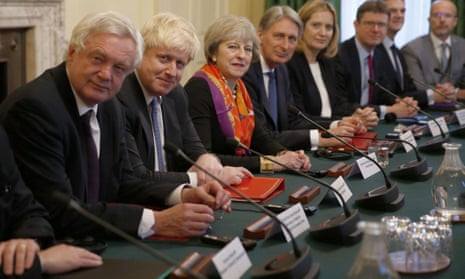For many years now the logo “Keep calm and carry on” has been a huge hit across Europe. You can find it on posters, T-shirts and mugs – both the original text as distributed in 1939, to steel the British people for the war to come, as well as many “funny” variations. The slogan’s popularity is easy to understand as it unites the most important positive stereotypes about Britain in Europe: a pragmatic and liberal island people who were on the right side in the second world war.
Yet as the government of Theresa May and its cheerleaders in the billionaire-owned press continue their illogical, ignorant and deluded promises and accusations over Brexit, it is time for Europeans to reconsider this idea of the British – or, to be more accurate, of the English.
For over a year now, virtually all signs coming out of London suggest that Europeans are not just bidding farewell to an EU member state. They must also come to grips with a future in which their neighbours across the Channel and the North Sea are no longer predictable or rational.
Britain’s reputation for reliability is simply not reconcilable with the presence of Boris Johnson in the cabinet. The country’s reputation for stable government cannot be squared with the impending Brexit-induced chaos and upheaval in Scotland and Northern Ireland. With every new round of applause from Viktor Orbán in Hungary, Marine Le Pen in France and Donald Trump, Britain’s image as one of “the good guys” in the global fight for liberal values looks more obsolete.
And then there is Theresa May herself. Her claim this week that the EU is trying to influence the elections in Britain through a leak to the Frankfurter Allgemeine Zeitung is the latest example of a long list of statements that simply make no sense. Britain is not the centre of the world, and the idea that EU leaders would sit together plotting a victory for Jeremy Corbyn is laughable.
Far more likely is that EU leaders decided to leak the proceedings of their dinner on Sunday with May in order to warn their own public about how irrational Britain has become. How the country believes itself to have the upper hand in a negotiation with a group of nations seven times its own size. How it wants to be part of the single market while refusing to recognise the authority of the European court governing that market. And, most alarmingly, how badly informed May still is about the practical consequences both of Brexit and of a no-deal crash out of the EU.
Perhaps other Europeans have never looked closely enough at the English. The fact is that millions of the English still believe what they have been told by the Brexiteers: that they can have the benefits of EU membership without its obligations.
If May were a stateswoman, she would now be preparing her own people for the very painful sacrifices ahead. Instead she prefers to indulge in the fantasy that Britain is still a world power capable of dictating its terms to other countries. Even worse, she is doing nothing to bring Brexit-sceptics – the 48% – back into the national conversation, preferring instead to let the tabloids engage in their intimidation and character assassination.
The British writer Martin Amis once wrote that his country had responded to the loss of empire by “embracing frivolity”. This is a beautiful and rather kind understatement to characterise the almost casual way in which Great Britain organised its EU referendum, how it waged the campaign, and how it has acted in the 10 months since.
As painful as it is for all those in Europe who loved the Britain they thought they knew, there is no escaping it: under the leadership of Theresa May the United Kingdom can no longer be considered a serious country.
